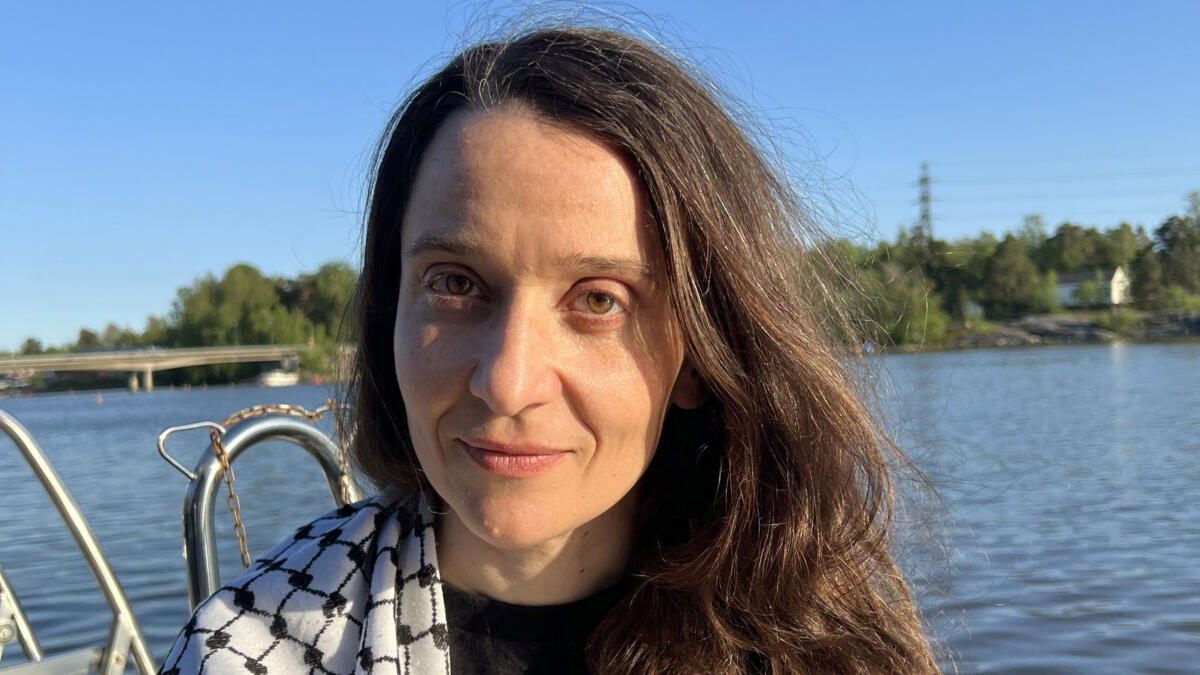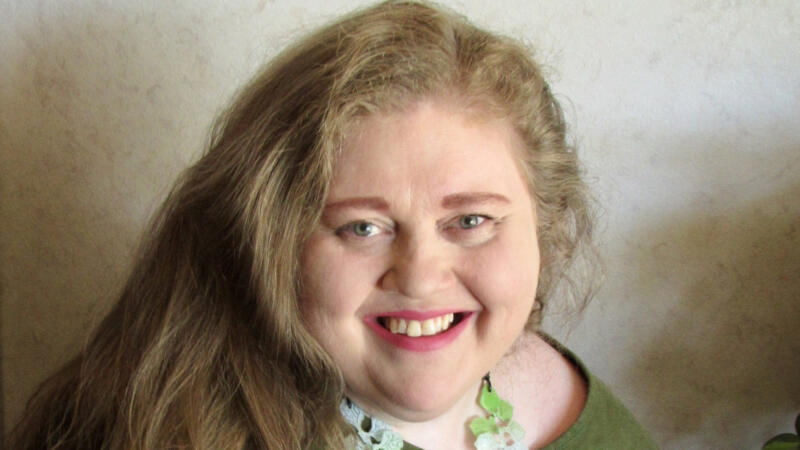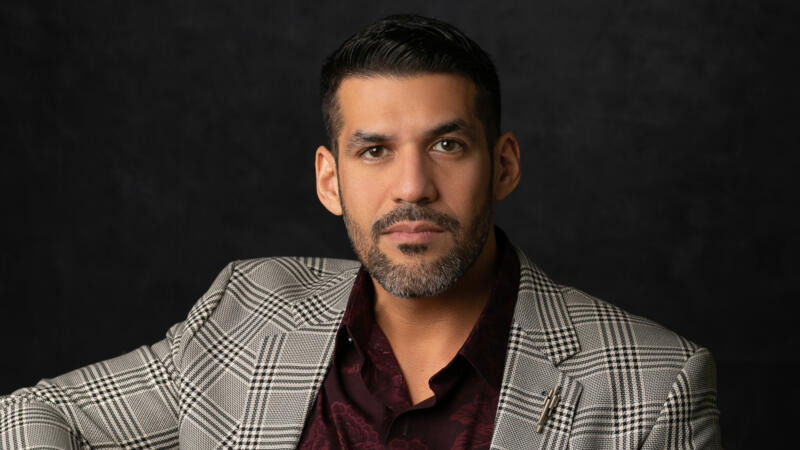Alum of the Year Noora Dadu: “Art is always inherently political in some way”
Actor Noora Dadu does not shy away from heavy and autobiographical topics, but she still loves playfulness. Dadu is one of Uniarts Helsinki’s Alumni of the Year 2025.

As a kid in school, Noora Dadu had a plan set out for her.
“I thought I had it all figured out – getting into the Theatre Academy after finishing school and then getting hired by the Kouvola City Theatre,” Dadu says and lets out a laugh.
Instead of becoming an actor on a municipal theatre’s payroll, Dadu is an artist showcasing her talents in various contexts: as an actor, director, playwright, author, reciter of poems as well as a social commentator and an activist for Palestine.
“It’s lovely getting Uniarts Helsinki’s Alum of the Year award specifically as an actor, because acting has been the gateway to many of my work roles.”
Persistent playfulness
What Dadu finds particularly fascinating in art and creating it is its playful element. That does not necessarily refer to humour, but the play aspect can manifest itself in the rhythm or contact between the actors, for example.
“When a performance emanates a playful nature one way or the other, it adds a layer of lightness to it, even if the topics that are being discussed are heavy,” she notes.
One of Dadu’s earliest experiences with theatre, which also involved the act of play, happened when she was about six years old.
“I was in Kuusankoski at a children’s theatre event where kids could go to a make-up artist’s booth and have their make-up done to resemble different characters. I got into character, played for a while, washed the make-up off and went back over and over again to get transformed into a new character,” she says.
When Dadu realised that this kind of “awesome fooling around” could be an actual hobby, she joined the Kuusankoski amateur theatre.
Being involved in the well-established group’s activities felt addictive. In her late teenage years, Dadu kept herself busy and performed in three to four productions per year.
She gained a lot of experience and had a strong passion to pursue the field further, but her road to the Theatre Academy was less than straightforward. Dadu applied to the acting programme for the first time after her second year in the general upper secondary school, but in her own words, she completely “choked” during the entrance exam.
The same thing happened a year later after graduating from school. It was upsetting, but Dadu did not intend to give up easily.
“I decided that I would apply ten times, and if that wasn’t enough, I would forget about the Theatre Academy and get into a school abroad.
The power of friendship
Finally, she achieved her dream on the fifth try, but the years before she got into the Theatre Academy were not easy for her.
Dadu struggled with an eating disorder and was treated for it at the Lapinlahti Hospital. It took some time, but eventually she came into her own, partially thanks to the Helsinki Student Theatre.
“There, I got to know Joanna Haartti, who became a really close friend of mine and later also a course mate,” Dadu recalls with a noticeably warm tone in her voice.
Haartti has left a lasting mark on Dadu’s career, too, including through their collaboration with the Estella ja Sofia trilogy, which they also partially wrote and directed for Teatteri Takomo.
According to Dadu, Haartti had an even bigger influence on her by being the convener of a collective called Viiksi and its Viiksi-instituutti performances.
“A collective work method and creating new ways of doing things as a collaborative effort have shaped my relationship with the stage in a major way and helped me grow as an artist,” Dadu says.
There is no permanent director in the collective, and instead, all members of the group take turns being teachers and students, so to say.
“Collaboration of this kind is crazy but educational and fulfilling. If you want to know how conflicts within you appear to others, you should start up a collective!”
Heavy, heartfelt topics
Professionally, Dadu is best-known for her impressive autobiographical works such as Minun Palestiinani and FAIL.
Writing the book Roolitus was also a very personal and meaningful project that came straight from her heart, but making it was a tough process.
In the book, Finnish-Palestinian Dadu critically examines the challenges of casting and representation in films and on stage through the lens of an actor.
Drawing from her own experiences, the essay collection also suggests concrete ways to dismantle the discriminatory gaze directed at certain actors – a gaze that reflects prevailing power structures and defines what is considered “normal”.
“Writing the book was difficult and took years, but it has been a gift for me and hopefully for the industry, too.”
Currently, Dadu is taking time to bounce back from the heavy workloads of recent years and preparing for upcoming projects. One of the scheduled projects is a new joint production involving three artists with a Palestinian background for Teatteri Takomo.
She will also continue working within the Sumud organisation, which she co-founded. The activist group works for ending genocide and apartheid and advocates for Palestinian rights.
The situation in Palestine is bleak and weighing on Dadu’s mind. She is deeply disappointed in the stance that the surrounding society and even the arts sector have taken regarding crimes against Palestinians.
“The boards of several theatres have ordered their employees to dissociate themselves from politics as if an institution is a neutral operator,” Dadu says.
Dadu points out that it seems to be okay to make all sort of art about atrocities that happened a long time ago, but now that there is an actual genocide going on that people could help stop, the decision is to stay silent.
“Seeing the media, politicians and the whole society around us be so passive has broken my heart more so than the genocide itself.”
Artists and the audience have the same freedom
During the last couple of years, Dadu has asked herself, for the first time ever, whether this reality is the right time for art-making. She has even thought of quitting the field.
“It’s been a painful but honest question that I’ve asked myself out of frustration over the existing power structures and attitudes.”
Dadu finds that all art is always inherently political in some way.
“Politics is not separate from art, just like no part of human life is. But it doesn’t mean that art is propaganda. It just means that we contribute to this world and have agency in it.”
When it comes to art, freedom is a crucial value for Dadu. For her, freedom means being able to define one’s own boundaries and space as an artist.
“The audience is entitled to the same freedom. I don’t want to plant pre-packaged ideas in people’s minds. I also don’t get offended if someone leaves a performance early,” she says.
Sometimes, an audience member’s early exit can even be a sign that the performance really hit the mark.
For example, Dadu was one of the performers in a play called Eduskunta, which was a satirical description about the Finnish Parliament directed by Susanna Kuparinen using real-life quotes from plenary sessions and official interviews.
“It was often that people would leave the performance before the end, and one time, a whole group of men in suits left during a particular scene,” Dadu says.
“It almost seemed like those exits could have been directed by Kuparinen.”
Is art accessible?
One thing that Dadu is worried about is the accessibility of art. Higher education is of good quality, but people should have an easier way of entering the path towards it at a much earlier stage.
But the situation seems bleak. As an example, Dadu mentions her own past source of inspiration, the Kuusankoski Theatre, which is no longer operating at the Kuusankoski House due to lack of funding.
Dadu is concerned that similar things will keep happening in other regions and theatre companies and create a vacuum that cannot be filled.
“At this rate, the question should soon rather be whether art is accessible to really anyone at all anymore and whether we have realistic possibilities to create it.”
Although Dadu wrestles with serious topics and questions from time to time, she has still chosen art – and theatre, especially – even after going through times of crises. Her passion for the field is still there.
“I don’t always know why I do theatre or why I act, but I still enjoy creating and I guess I need that world where we do and imagine things differently to understand the reality we live in. As long as that remains the case, I will keep going.”
Text: Elli Collan
Noora Dadu, b. 1981
- Graduated from the Theatre Academy in 2010
- Young Poet of the Year 2006 (Veikko Sinisalo Competition)
- Young Actor of the Year 2015 selected by the Union of Finnish Actors
- Activist: Founding member and former chair of the Finnish Palestine network Sumud. Co-organiser of the cultural boycott of Israel to end apartheid since 2021.
- Nuori voima Prize in 2023 for her book Minun Palestiinani ja Fail (T/U/A 2022)
- Wrote a book on representation problems in casting titled Roolitus (Vastapaino, 2024)
- Lives and works in Helsinki
The title of Alum of the Year is awarded each year to select alumni from Uniarts Helsinki’s three academies who have highlighted the unique value and role of art and artist education in an exemplary manner through their work.

